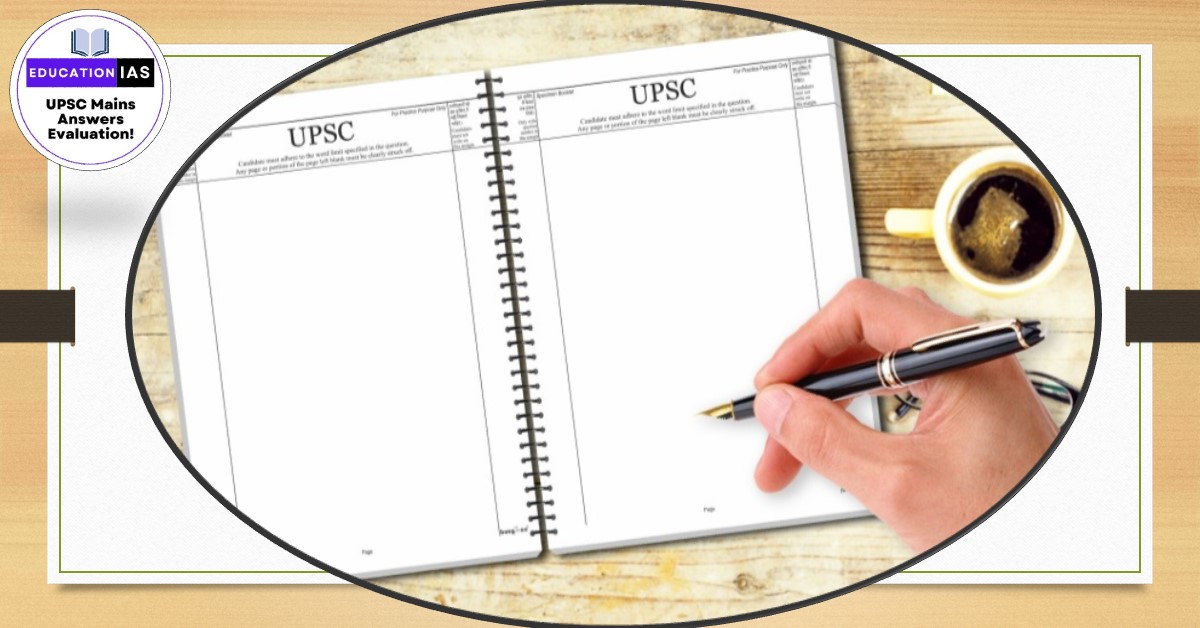Que. Discuss the role of the Election Commission of India in the light of the evolution of the Model Code of Conduct.
आदर्श आचार-संहिता के उद्भव के आलोक में, भारत के निर्वाचन आयोग की भूमिका का विवेचन कीजिए।
Structure of the Answer
(i) Introduction: Introduce the significance of the “Election Commission of India” (ECI) in ensuring fair elections and its role in the evolution of the “Model Code of Conduct” (MCC) to regulate electoral practices.
(ii) Main Body: Discuss the historical development of the MCC, the ECI’s responsibilities in its implementation, challenges faced, and the potential for future enhancements to ensure fair electoral processes.
(iii) Conclusion: Summarize the critical functions of the ECI in enforcing the MCC and emphasize the importance of continuous improvements to uphold democratic integrity in India’s electoral framework.
Introduction
The “Election Commission of India” (ECI) is vital for ensuring free and fair elections. The “Model Code of Conduct” (MCC) has evolved as a crucial framework to regulate political conduct, thereby enhancing electoral integrity.
Historical Development of the Model Code of Conduct
(i) Initial Context: The MCC was first introduced in “1960” as a guideline to promote ethical behavior among political parties during elections, ensuring fairness and transparency in the electoral process.
(ii) Formalization in 1991: The ECI officially adopted the MCC in “1991” during general elections, establishing a standardized set of norms for political parties to follow, thereby enhancing accountability and integrity in elections.
(iii) Key Principles of the MCC: The MCC is anchored in principles such as “fairness,” “transparency,” “accountability,” and “ethical conduct,” aimed at ensuring a level playing field for all political stakeholders.
(iv) Periodic Revisions: The MCC has undergone periodic revisions to address the changing dynamics of political campaigning, ensuring its relevance in modern electoral practices and reflecting current societal values.
(v) Incorporation of New Guidelines: The MCC has been updated to include guidelines addressing “hate speech,” “social media,” and “expenditure limits,” reflecting the evolving nature of electoral campaigns in the digital age.
The Role of the Election Commission of India in Implementing the MCC
(i) Monitoring Compliance: The ECI is tasked with monitoring compliance with the MCC, ensuring that political parties and candidates adhere to its provisions throughout the electoral process.
(ii) Issuing Comprehensive Guidelines: The ECI regularly issues detailed guidelines under the MCC, clarifying permissible and prohibited activities during elections to aid political parties in understanding their responsibilities.
(iii) Enforcement Mechanisms: The ECI has established robust enforcement mechanisms to address violations of the MCC, including issuing warnings, imposing fines, and taking disciplinary actions against offenders.
(iv) Public Awareness Campaigns: The ECI conducts campaigns to raise awareness about the MCC among voters and political parties, ensuring that stakeholders understand their rights and responsibilities during elections.
(v) Collaboration with Law Enforcement Agencies: The ECI collaborates with law enforcement and other governmental bodies to ensure adherence to the MCC, providing a comprehensive approach to maintaining electoral integrity.
Challenges in the Implementation of the MCC
(i) Lack of Legal Enforcement: The MCC, while influential, lacks statutory backing, which poses challenges for the ECI in imposing penalties for violations and limits its effectiveness in enforcing compliance.
(ii) Evolving Nature of Political Campaigning: The rise of “social media” and digital campaigning presents challenges in monitoring and regulating conduct under the MCC, necessitating continuous adaptations to the code.
(iii) Diverse Political Contexts: The diverse political landscape of India complicates the uniform application of the MCC, as regional parties may interpret guidelines differently based on local contexts.
(iv) Voter Awareness and Engagement: Ensuring that voters are adequately informed about the MCC and its significance is essential. Limited public awareness can undermine the effectiveness of the MCC in promoting ethical conduct.
(v) Insufficient Resources for Enforcement: The ECI often faces resource constraints that limit its ability to monitor and enforce compliance effectively, especially during large-scale elections with multiple constituencies.
Future Directions for Strengthening the MCC
(i) Legal Framework for Enforcement: Establishing a statutory basis for the MCC can empower the ECI to enforce its provisions more effectively and hold violators accountable for their actions.
(ii) Utilization of Technology: Leveraging technology, such as AI and big data, can enhance the ECI’s monitoring capabilities, enabling real-time tracking of compliance and quicker responses to violations.
(iii) Strengthening Training Programs: Implementing comprehensive training programs for election officials on the MCC can improve their understanding and efficacy in enforcing its provisions during elections.
(iv) Enhancing Public Participation: Encouraging citizen involvement in monitoring electoral conduct can foster greater accountability, enabling voters to report violations and demand adherence to the MCC.
(v) Robust Voter Education Initiatives: Expanding efforts to educate voters about the MCC, their electoral rights, and the significance of ethical conduct can empower citizens and enhance electoral integrity.
Conclusion
The “Election Commission of India” plays a vital role in ensuring free and fair elections through the “Model Code of Conduct.” Continuous evolution and adaptation of the MCC are essential for maintaining electoral integrity and democratic values in India.
